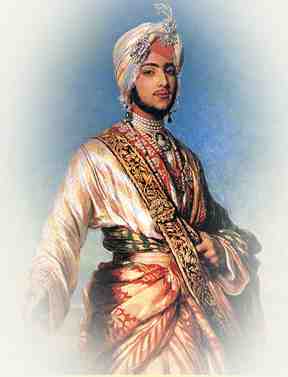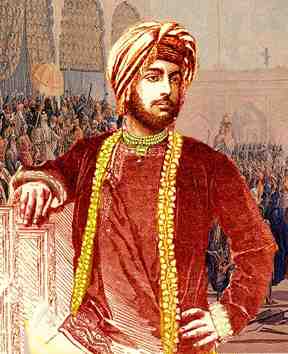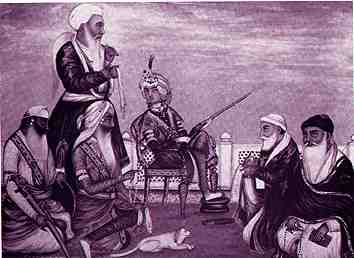Maharaja Dalip Singh
The Last King of a Lost Kingdom

EARLY HISTORY OF THE PUNJAB BEFORE THE ACCESSION OF THE MAHARAJAH DULEEP SINGH!
INTRODUCTORY
The Punjab was originally colonized by the Hindoos, but came under Mussulman sway about the year 1000, and from the year I504 formed part of the great Mogul Empire seated at Delhi, until that dynasty was assailed on many sides and finally extinguished in the eighteenth century.
During the decay of the Mogul Empire the Punjab was invaded and conquered by Persian or Afghan Mahornedan rulers from Cabul, who in their turn were attacked and displaced by the Sikhs, towards the end of the eighteenth century.
The Sikhs were essentially a Hindoo race inhabiting the Punjab; at enmity with the Mahomedans, but not disdaining Mahomedan converts. They were originally a religious sect, founded by Nanuk about I500, at first peaceable and small in numbers, but being persecuted, became after I6o6, under Hur-Govind, a warlike tribe, with national tendencies and aspirations: waging war against the Mussulman chiefs varying success, until they at length succeeded in establishing an independent kingdom of the Punjab, with the capital of Lahore, under Runjeet Singh. This event took place at the very end of the last or the beginning of the present century.
Runjeet Singh became master of Lahore about 1799, having obtained a grant from the Afghan King, Shah Zuman, and was recognized by the British Government as sovereign of the Punjab in 1809 by a treaty of perpetual friendship, in which he ceded to the East India Company all Sikh territory lying to the south of the river Sutlej, and received an assurance of freedom from attack for all the country north of that river.
Previously to Runjeet Singh's time, the Sikhs had acquired dominion over a considerable territory, which they held as a commonwealth, the chiefs of which were landowners as well as military leaders. Runjeet himself was only one amongst other chiefs of co-ordinate rank, his supremacy being due entirely to his personal courage and ability.
Until Runjeet planted himself firmly at Lahore, the Sikhs always considered themselves and the Punjab generally to be subject to the over-lordship of one or other of the great Mussulrnan rulers, either at Delhi or at Cabul, according to their respective strength or the fortune of war. So that tribute to one or other of those Powers was always recognized at least as due, if they were strong enough to collect it.
This state of nominal vassalage ceased with the establishment of Runjeet Singh's power. He raised the Sikh commonwealth to the dignity of an independent nation, with himself as its head. He did not profess to exercise despotic power but ruled in the name of the commonwealth or Khalsa.
Runjeet Singh died in June 1839, and was succeeded on the throne of the Punjab by his son, Kurruck Singh. Kurruck Singh died in 1840, and was succeeded by his son, Nao-nihal Singh, who reigned, however, only for a day.
Nao-Nehal Singh was succeeded by Shere Singh, another son or adopted son, of Runjeet. He died in 1843. Duleep Singh, the youngest son of Runjeet, succeeded Shere Singh. Duleep was then five years of age: his mother, the Ranee Jinda, became his guardian. Maharanee Jindan was removed from the guardianship of her son by the British Government in 1846, and a Council of Regency appointed for the infant Maharaja, under the control of a British Resident.
In 1849 the British Government deposed the Maharaja Duleep Singh and annexed the Punjab; since which time it has been under British rule, and the Maharaja has been a pensioner of the British Government.

